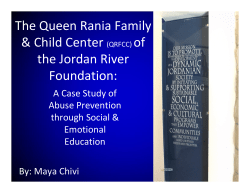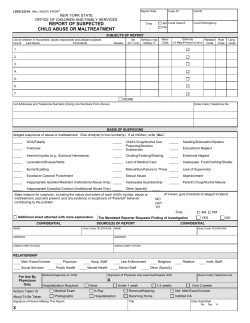
Document 219798
MUN BRIEFING PAPER Femme Fatale - How to prevent women abuse? Hi delegates, Iʼm Natsuki Hara and I will be chairing the Human Rights II committee alongside Matt Marriott and Rowan Salisbury. So far I have been to eight MUN conferences but this will be my first ever MUN conference as a Chair! It took me a long time to speak in MUN but once I got over my nerves and did, it was so much more fun and I wish I had started to earlier. So please try to speak even if this will be your first conference. You will have a brilliant time if you do, I promise! Key points in this Briefing Paper: The numbers of female abuse cases; who is most likely to become victims and abusers; problems for victims; how children are affected; and what could be done. Background information Most countries today have laws in order to protect women in their country, however the number of women being abused in the world are still extremely high. Even in MEDCs where there are in general more rights and equal opportunities for women, they are still abused on a daily basis. What counts as abuse? This can be any kind of abuse such as physical, verbal, psychological and financial. There are statistics that show that 1 in 4 women will be a victim of domestic abuse in their lifetime and many more than once in their life. Around 20% of children are sexual violence victims, according to international studies. A domestic violence incident is reported to the police every 1 minute in the world; this shows how crucial it is for us to act quickly to lower the number of cases and eventually if possible put an end to female abuse. Women who are victims of abuse often suffer isolation leading to not being able to work and this could mean that the family may not receive enough income. UNWOMEN is a UN body, which deals with issues surrounding women. The question is: should UNWOMEN do more to prevent female abuse? Victims and abusers Many abusers who are without a good knowledge about gender equalities, communication and relationship skills to all children are more likely to abuse women. Well educated men are less likely to abuse women and women are more likely to speak out if they have been educated about this and are being abused, as they will learn that it is acceptable to speak out. It can be harder for victims to receive help in countries where female abuse is not seen as a very big concern, resulting in problems for victims in those countries. Children who have experienced abuse or seen their parents involved in violence have a higher chance of becoming perpetrators themselves or victims. If people are more accepting of violence they too are likely to become perpetrators or victims as victims will not try to stop the abuse if they are accepting of violence. There are forced marriage and human trafficking cases where young girls are sold off to men and abused by them. This can happen with their parents consent or if they are abducted. Victims of abuse are subject to many health consequences. For example they can get headaches, abdominal pain, back pain and general poor health. Women who are abused while pregnant can have miscarriages, still birth, pre-term delivery and low birth rate. In countries such as the United Kingdom abuse if more easily spotted if women go to hospital for any reason, but in other countries where there is not a good healthcare system abuse cannot be spotted as George Watson’s College MUN Conference 2013 MUN BRIEFING PAPER easily by health professionals. Female abuse often happens behind closed doors and the women usually do not like to talk about it, so it is extremely difficult to spot. Violent abuse can also lead to depression, emotional distress, sleep difficulties, eating disorders and suicide. Sexual abuse results in a higher risk of smoking and alcohol misuse, especially if there is sexual abuse during childhood. Women, especially in LEDCs, cannot get help to cope with health problems such as these, which is a major problem as it is extremely hard to recover from these health problems in isolation. Children Children born into families where they are abused need help. Growing up in an abusive environment can be traumatic and it is detrimental to the childʼs development and growth. Health problems can arise in children as a result of abuse, the same as adults. Points to consider Should countries create more legislation and policies to protect women? Would improving education systems be a priority to lower female abuse cases in future, and what is the best way to prevent female abuse? What can be done for women currently in a situation where they are being abused? Find out how much your country is doing to protect female abuse victims and if they consider female abuse as a priority or not. Please send your Position Paper for this topic (and remember you have to do one for each of the Committee Topics) to me by Friday 15th February at the latest to natsukiharamun@gmail.com, especially if you want to be considered for an award. A Position Paper is quite easy: just write about 50 words about your countryʼs view on this topic. Also bring your Resolutions (write at least 2) with you on the day. I canʼt wait to see all the ideas you come up with! Email me if you have any questions and I will be happy to do my best to try and help. Good luck with your research and Resolutions, I am looking forward to meeting you all in March! Useful links For this topic: http://www.womensaid.org.uk/domestic_violence_topic.asp?section=0001000100220041 http://www.prb.org/Articles/2004/DomesticViolenceinDevelopingCountriesAnIntergenerationalCri sis.aspx http://www.unwomen.org/focus-areas/?show=Violence_against_Women http://www.who.int/mediacentre/factsheets/fs239/en/ George Watson’s College MUN Conference 2013 MUN BRIEFING PAPER For country profiles and other useful information: http://www.nationsonline.org/oneworld/ http://news.bbc.co.uk/1/hi/country_profiles/default.stm http://www.un.org For issues of current international debate: http://www.newint.org/ http://www.idebate.org/ http://www.amnesty.org/ George Watson’s College MUN Conference 2013
© Copyright 2025
















